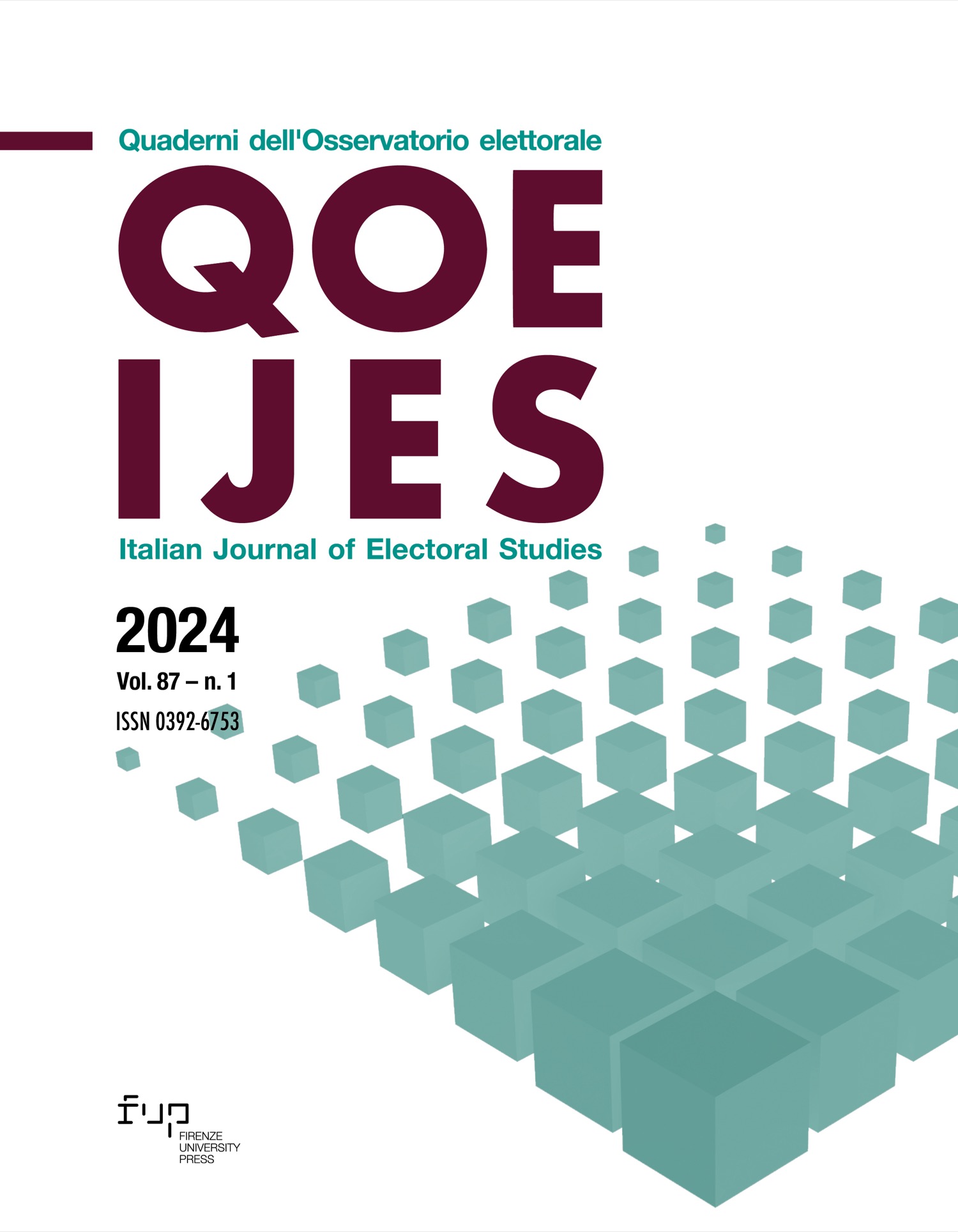Vol 87, No 1 (2024)
Issue Description
The QOE-IJES new issue includes six original research articles, as follows.
The first one is “Increasingly unequal. Electoral participation and political inequalities in a context of decreasing unionization in Italy (1983-2018)”, by Davide Angelucci. He explores the reasons why turnout has become increasingly unequal in many advanced democracies over the last few decades, stressing the case of Italy. By utilising a dataset that combines ten waves of the Italian National Election Study (1983-2018), the paper demonstrates that the turnout gap between low and high socio-economic status individuals has substantially widened over the last decades. Crucial is the of trade unions tin mobilizing electors.
The second article is “When a woman asks a sexist constituency to be voted: was Giorgia Meloni’s gender an advantage, a disadvantage or an irrelevant factor in the 2022 Italian general election?” by Nicoletta Cavazza and Michele Roccato. In the study, authors investigated whether Giorgia Meloni’s gender was an advantage, a disadvantage, or an irrelevant factor in the 2022 Italian general election. The conclusion is that Meloni’s gender did not affect the outcome of the 2022 Italian general election.
The third article is “This is not US: measuring polarisation in multiparty systems. A quasi-replication study”, by Luana Russo, Emma Turkenburg, Eelco Harteveld and Anna Heckhausen. Affective polarization has become an increasingly salient topic in both public discourse and political science. While several different measurement instruments have been developed to empirically capture this phenomenon, the results indicate that, while different items usually produce different point estimates and sometimes different answer patterns, the measurement of affective polarization appears relatively indifferent to the choice of items.
The fourth article is “Do parties adjust their policy proposals to the political context? A study of election promises during the 2022 Italian general election”, by Giorgia Borgnino and Nicola Palma. The paper investigates towards which policy issues Italian political parties oriented their commitments in the run-up to the 2022 parliamentary election. Although the Ukrainian war, the resulting energy crisis, and the implementation of EU-funded investments were the backdrop to the 2022 electoral campaign, Italian political parties do not seem to prioritize issues. By looking at the programmatic policies included in the campaign manifestos of the main political parties and coalitions during the last general election, authors find that Italian parties seem to compete around the same issues. In particular, in 2022 a large share of election promises was devoted to economic and social matters.
The fifth article is “Citizens’ perceptions of policy, policy measures and trust in political institutions after the first wave of COVID-19”, by Vincenzo Memoli. As the author argues, during the first wave of the pandemic, political trust was correlated with public adherence to infection containment measures in the major democracies. How about at the end of the first wave? After analysis, author shows that, at the end of the first wave of the pandemic, political trust was positively affected by institutional performance and only partially affected public perceptions and the policy measures taken by governments to contain the spread of the virus.
The final article “Weighed, not counted: territorial (mis)representation in Italian metropolitan council elections", by Giancarlo Gasperoni, highlights the variety of ways in which demographic weighting bestows significantly greater power to larger cities’ representatives - essentially disrupting the principles of territorial representation that the weighting scheme intended to embody. The study also focuses on how the legal framework for metropolitan council elections generates institutional instability via mandatory forfeitures and ensuing substitutions of seat vacancies, and it suggests the attenuation of disproportionate territorial representation via demographic weighting based on the so-called square-root method.
Enjoy your scientific reading!

